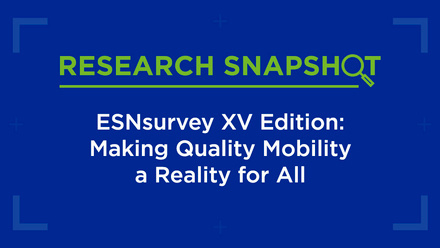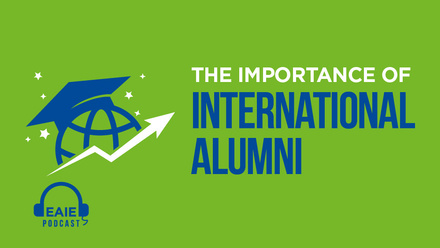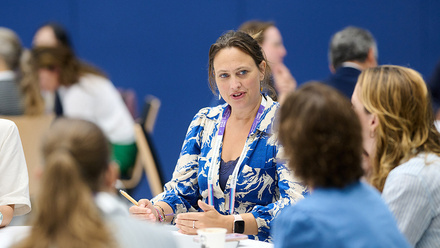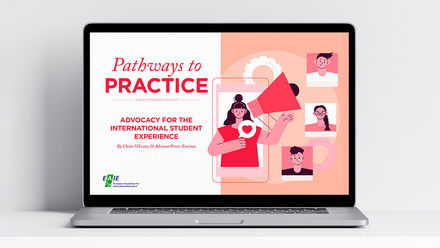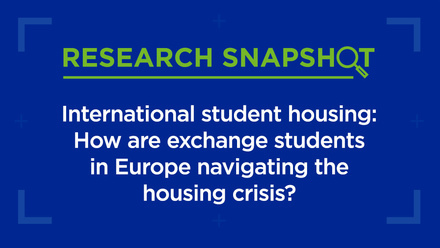What Ukrainian students abroad need now

Academic mobility programmes and initiatives for the internationalisation of education started arising after World War Two as a tool to promote peace and understanding between nations. Today, nearly 80 years later, academic exchanges are also providing a route to safety for many students fleeing the Russian invasion of Ukraine.
According to the United Nations, the Russian invasion has led to more than 4.7 million Ukrainian refugees fleeing across Europe. Many of these are students who are now unable to continue their education at home. Many higher education institutions have opened their doors to students fleeing the war. Unfortunately, there are no official statistics about how many students from Ukraine are now enrolled as students or attending lectures as guest students, leaving us largely in the dark regarding the number of students, the challenges they are facing and their general well-being.
Information, finances, housing and language support must become areas of focus for HEIs hosting Ukrainian students
For these reasons, a group of organisations have come together to gain insights into these questions. Erasmus Student Network Ukraine, the Ukrainian Student League, Ukrainian Students for Freedom, and various other students and volunteers with the support of the National Erasmus+ Office in Ukraine have collaborated to conduct a survey of Ukrainian students abroad.
The survey
In less than a month, the survey garnered a considerable 528 responses. While this survey of course is not representative of the whole of Ukraine, we believe that this exercise provides a helpful closer look at the current situation, yielding helpful recommendations based on the results and analysis.
First of all, it is important to remember that the absolute majority of the refugees from Ukraine are women. Moreover, our survey showed us that most of them are under 21 years old. The specifics of the education system in Ukraine create an additional issue: 17% of the respondents are 17–18 years old, underscoring the fact that a sizeable number of underaged students may face unique challenges upon leaving their country.
The absolute majority of the refugees from Ukraine are women; most of them are under 21 years old
The survey was divided into six parts and covered general issues as well as problems within Ukrainian home institutions and host institutions abroad. Here we will explicitly focus on the host institutions, however the whole report can be found on the ESN Ukraine website.
What follows are selected results and recommendations related to the key issues addressed by the survey.
Dissemination of information
Of the respondents, 83% stated that they had not previously participated in exchange programmes, academic mobility, internships, volunteering etc abroad. This suggests that the majority of students might be confused by the different education systems or study programmes in which they now find themselves. This suggests a need for wider dissemination of information, consultations from universities and activities aimed at explaining the principles of mobility, existing exchange programmes and differences between education systems within Europe etc.
Additionally, 6% of respondents are still looking for learning opportunities abroad and 10% are hesitant about deciding where to continue their studies. We believe that this points to the importance of disseminating information about opportunities for studying abroad. Actors in the international education sector thus need to prioritise promotion of resources, media channels and websites that compile study abroad opportunities, as well as clear communication on the options within the Erasmus+ programme and other academic exchange programmes. It is especially important to reach marginalised groups of young people who have no previous experience with international programmes.
Respondents who have already found options for continuing or starting their studies abroad mainly found their information on the internet or through the advice of their Ukrainian universities, thus we believe that these two areas should be prioritised for disseminating information.
Financial support
Only 26% of respondents said they would receive financial aid or a scholarship abroad. 54% do not yet know whether they will have financial support and 19% answered that they will not have it at all. Additionally, 68% of respondents indicated that they will need to combine studying and working.
68% of respondents indicated that they will need to combine studying and working
We are convinced that the combination of study and work will significantly affect the quality of students' learning process, their mental health and their level of adaptation to life abroad, especially given that they are all victims of war, experiencing significant stress and psychological pressure. Thus, we see a crucial need for financial support of students in the form of specific grants and scholarships for Ukrainians, general grants for exchange students (such as Erasmus+ scholarships) or privately-organised funds for refugees.
Housing
Only 21% of respondents indicated that the university helped with accommodation, for example in a dormitory. 17% answered that they do not have such help, and 54.5% are still unsure about their housing situation.
We are grateful for the opportunities for Ukrainian refugees to live in asylum centres or be hosted by local families, however, we would like to point out that these options are not always optimal for students due to the location of housing (ie the distance between the accommodation and university), living and studying conditions (eg no space for studying), or the general atmosphere. We call upon universities to provide an option of subsidised student accommodation or initiate a fund within the local community to support the possibility for students from Ukraine to move to private student accommodations.
Language support
In answering the survey, 56% of respondents said that they have a full need and 10% that they feel a partial need for language courses in the host country. In particular, 67% of them need courses in the national languages of their host countries and 33% need English language courses.
Language is among the top five issues which need to be addressed according to the survey
Knowledge of the local language is a definite asset to the process of integrating into society. Thus, it is no wonder that language is among the top five issues which need to be addressed according to the survey. We believe that, apart from the initiative of the Erasmus+ programme to open its Online Linguistic Support tool for students from Ukraine, more actions could be done on the institutional level, such as language courses (offline or online), tandem initiatives, peer-to-peer mentoring and volunteer teaching, or partnering with local private-sector language course providers.
These four key areas – information, finances, housing and language support – must become areas of focus for higher education institutions hosting Ukrainian students. As the war continues into its fourth month and media attention begins to die down, it is important to remember that until there is rest and safety for people from Ukraine, there is no peace in Europe. Let those of us in the international education sector stand strong together for those in need.


